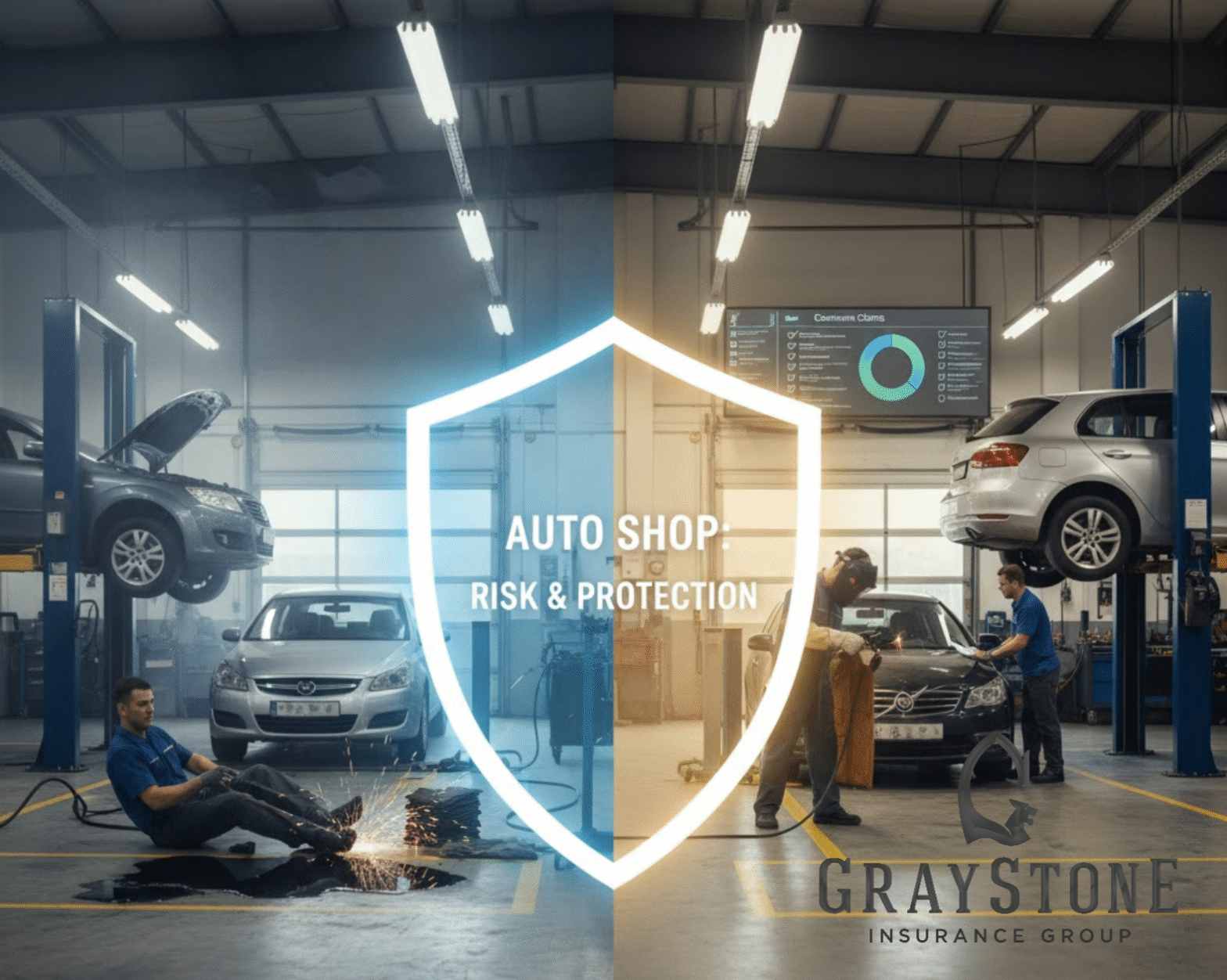
Running a successful auto repair shop, whether you are located in Texas, Tampa, Denver, or New York, means you have risks every single day. From a slip in the lobby to a dropped tool on a customer’s car, small problems can quickly become expensive insurance claims. This guide from GrayStone Insurance Group looks at the top five claims that auto shops see most often, and gives you clear steps to keep your shop safe, protect your team, and save money on your insurance costs.
Based on the common risks and solutions detailed in the article, here are the most important takeaways for protecting your auto repair business:
The five most common insurance problems auto repair shops face are claims related to customer cars getting damaged, fires and property damage, customer accidents like slips and falls, employee injuries on the job, and mistakes in repair work (faulty workmanship). Knowing these common risks is the first step toward preventing them entirely.
1. Damage to Customer Vehicles While in the Shop
This is often the most frequent claim because accidents happen quickly when moving or working on customer vehicles. These claims happen when a customer’s vehicle is damaged by something your shop does, like when a car is accidentally backed into a pole, scratched by tools, or falls off a hydraulic lift.
2. Fires and Major Property Damage
Fires are a huge risk for auto shops because they contain many flammable things, like oil, gasoline, and cleaning chemicals. A fire claim is often catastrophic, meaning it can destroy the entire business, which is why protection is critical. Even a small electrical issue or welding spark can quickly turn into a total loss.
3. Customer Slips and Falls (General Liability)
Auto shops are busy places with oil spills, wet floors, and parts that can stick out into walkways. When a customer or delivery person gets hurt in your shop’s parking lot, service bay, or office, your General Liability insurance steps in to cover their medical bills and legal defense.
4. Employee Injuries (Workers’ Compensation)
Handling heavy parts, working with dangerous power tools, and performing tasks in awkward positions makes auto shop workers highly likely to get hurt on the job. Workers’ Compensation insurance covers the employee’s medical bills and some lost wages when they suffer an injury or illness from their work.
5. Faulty Workmanship and Errors
This claim happens when the shop makes a mistake during a repair that causes more problems for the customer later. The claim is filed not for the initial repair cost, but for the damage that resulted from the error. This is usually covered by the Errors & Omissions or Garagekeepers part of your policy.
The right insurance for your auto shop protects the business from all the common risks, including the vehicles you work on, the building you own, and the safety of your staff and customers. It is important to know that a single policy won’t cover everything.
Is my regular business property insurance enough to cover customer cars?
No, your regular property insurance only covers your building and your own tools and equipment. You need a separate type of coverage called Garagekeepers Liability to protect the customer’s vehicles while they are parked, being serviced, or stored on your lot.
What is the difference between General Liability and Garagekeepers Liability?
General Liability covers accidents involving people who are not your employees (like a customer slipping and falling). Garagekeepers Liability only covers damage to the customer’s vehicle that is under your care, like if the car is stolen or damaged by a fire while parked in your service bay.
If my employee gets hurt, why do I need Workers’ Comp if I have health insurance?
Workers’ Compensation is a special type of insurance that is required by law in most places. It covers all medical costs related to a work injury and also pays the employee for some of their wages while they are unable to work, protecting both the employee and the business from lawsuits.
How can I lower the cost of my auto shop insurance?
The best way to lower your insurance costs is by having fewer claims. Insurance companies often give discounts to shops that have a strong history of safety, use written safety manuals and training programs, and install extra safety measures like security cameras and fire suppression systems.
Protecting your auto shop business in locations like Texas, Tampa, Denver, and New York requires more than just good mechanics—it requires smart risk management. By focusing on simple safety steps and making sure you have the right mix of insurance (General Liability, Garagekeepers, and Workers’ Comp), you can protect your financial stability against the five most common claims. Don’t wait for a small accident to become a major financial problem.
Ready to review your shop’s safety plan and coverage? Contact GrayStone Insurance Group today for a comprehensive risk assessment. Our experts will make sure your business is covered against every challenge